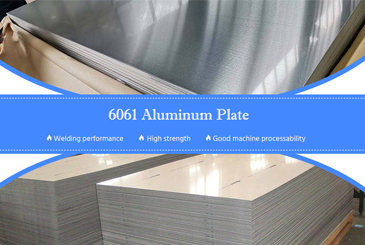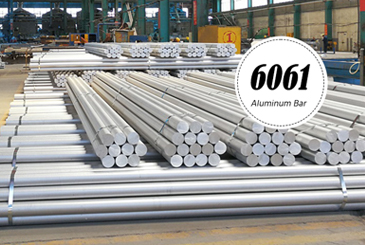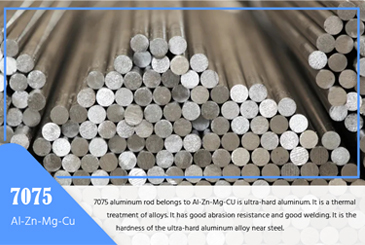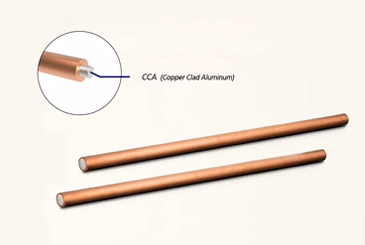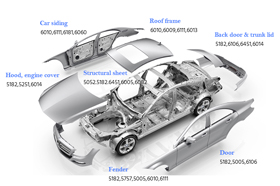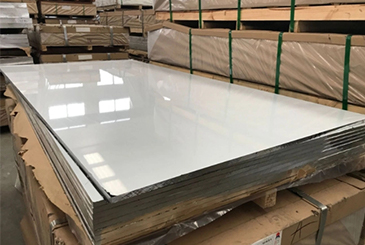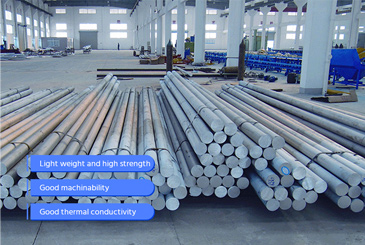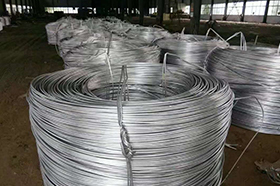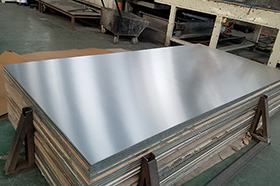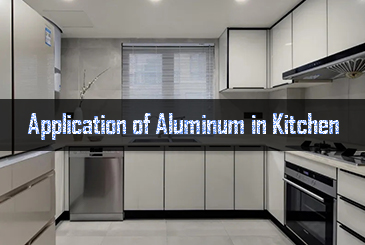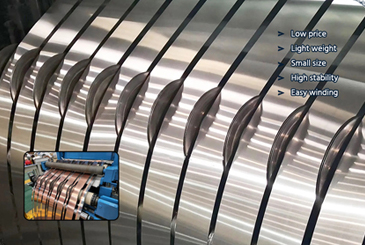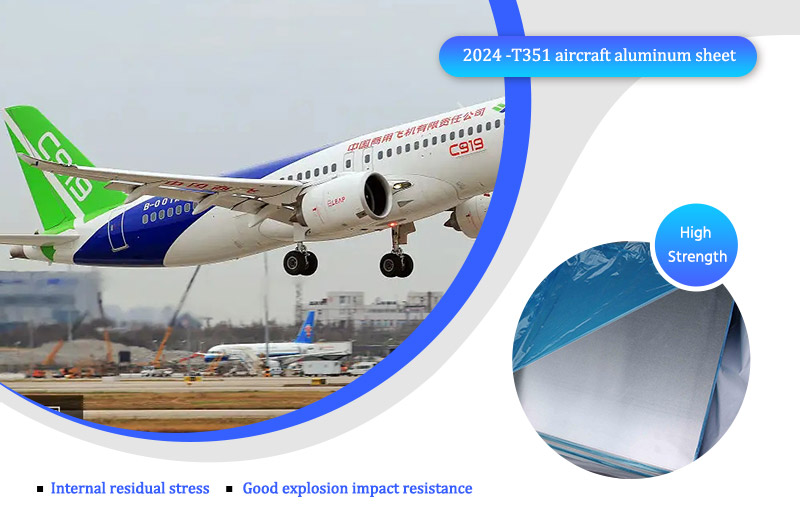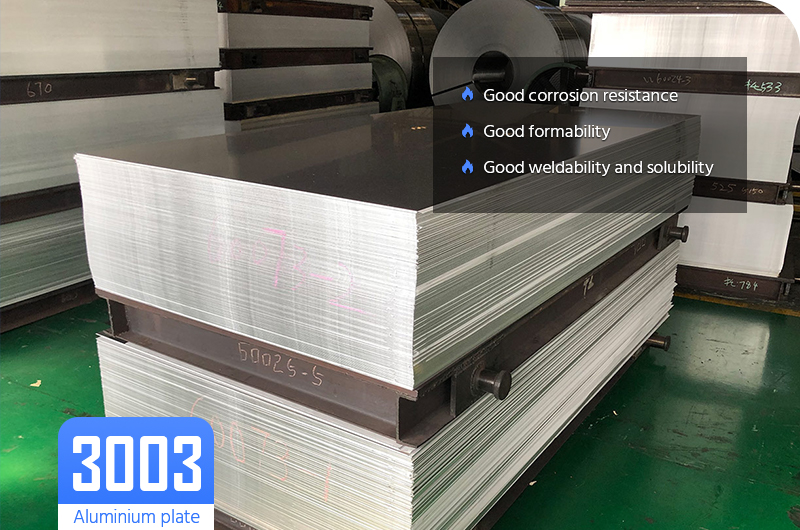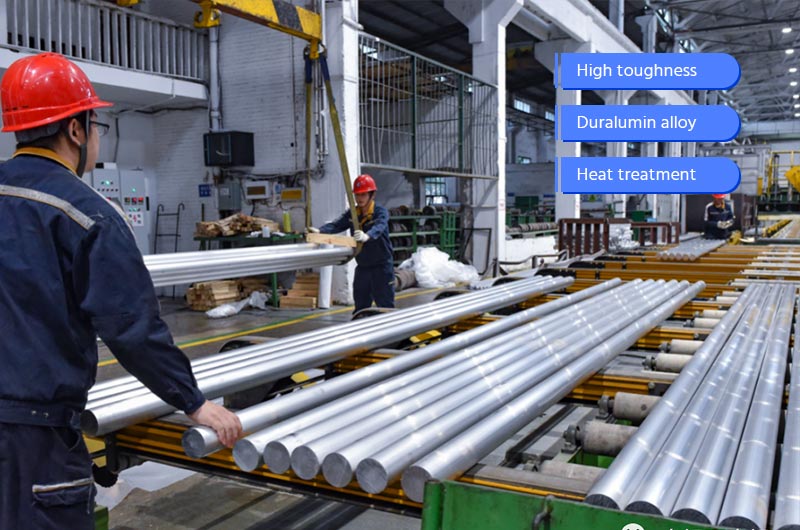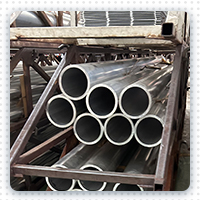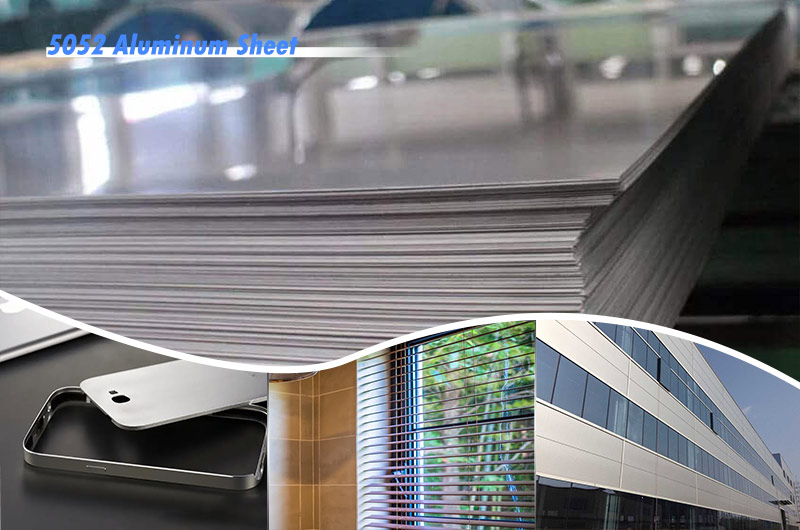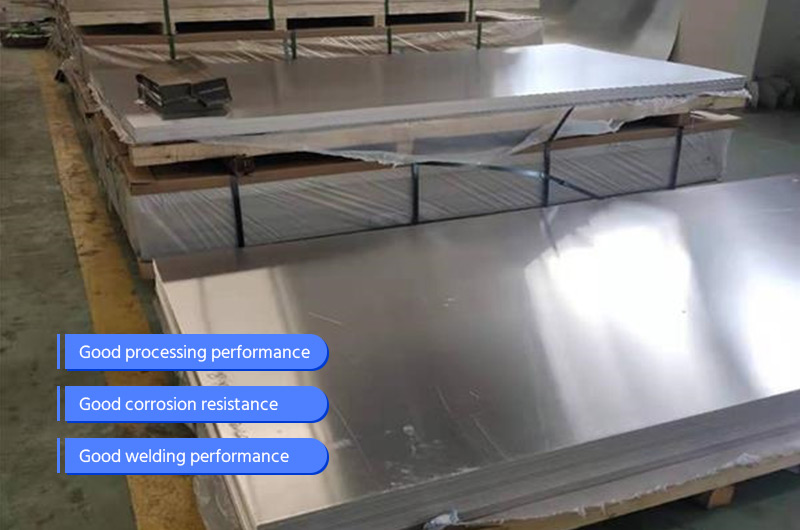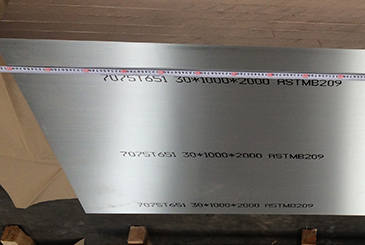Wheel materials are mainly divided into two categories: steel and aluminum alloy. Steel wheels are made from steel materials and have been the earliest used material for automotive wheels.
They are known for their affordability, high strength, good wear resistance, and simple manufacturing process, making them widely used in various mid-range and low-end cars and trucks.
On the other hand, aluminum alloy wheels are primarily made from aluminum with the addition of elements such as manganese, magnesium, chromium, and titanium.
They offer several advantages, including lightweight design, high manufacturing precision, strong strength, low inertia resistance, excellent heat dissipation, and appealing visual effects. However, they require complex manufacturing processes and come with higher costs.
Next, Chalco will guide you through the key differences between aluminum alloy wheels and steel wheels.
NO.1 Material
Aluminum alloy wheels come in various alloy grades, including A356, A356.1, A356.2, 6061, 6063, and 6082.
These aluminum alloys boast outstanding features such as high strength, lightweight, excellent heat dissipation, and ease of processing and welding.
Steel wheels, on the other hand, offer material choices like carbon steel, ductile iron, and other steel variants.
These materials are known for their cost-effectiveness, high mechanical properties, and toughness. However, they are generally not as suitable as aluminum alloy wheels.
NO.2 Manufacturing process
Steel wheels are made from alloy steel plates processed through rolling and stamping to create wheel rims, spokes (or steel wires), and then assembled using methods like riveting, welding, and extrusion.
On the other hand, aluminum alloy wheels are manufactured using casting and forging techniques, followed by spinning and forging processes, enabling integrated production and the formation of a seamless structure.
In summary, the casting process for iron components is more intricate than aluminum alloy techniques, involving higher melting temperatures and less favorable production environments, resulting in relatively higher machining difficulties.
NO.3 Beautiful
Aluminum alloy wheels offer significant advantages in aesthetics, as their casting process allows for various design options.
The surface of aluminum alloy wheels is bright and easy to clean, elevating the vehicle's overall appearance and visual appeal. In contrast, ordinary steel wheels may lack the same visual attractiveness.
Furthermore, aluminum wheels showcase a diverse array of patterns and precise dimensions, adding a touch of personalization to the vehicle and enhancing its overall beauty.
Conversely, steel wheels generally have a more simple and unembellished appearance, with limited scope for varied designs and personalized styles.
Although steel wheels perform their basic functions effectively, they might appear somewhat plain compared to aluminum wheels in terms of aesthetics.
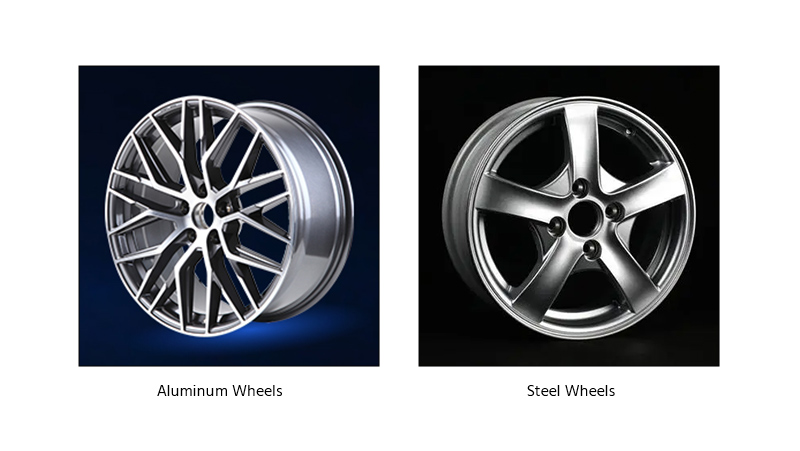
NO.4 Economy
Steel wheels are cost-effective and possess good flexibility, making them easily repairable and highly durable.
In contrast, aluminum alloy wheels come at a higher cost, approximately 2-3 times more than ordinary steel wheels. However, the fuel savings achieved over 20, 000 kilometers of driving are sufficient to offset this initial investment.
Furthermore, aluminum wheels have a higher recyclability, contributing to a greener environment.
Some manufacturers offer enticing trade-in deals, where customers pay only half the price of new wheels when exchanging their old ones, making long-term wheel replacement costs more manageable and rendering aluminum wheels a viable option for extended use.
NO.5 Driving experience
Aluminum wheels offer high roundness and precision, ensuring a smooth and stable driving experience with no steering wheel vibrations.
This enhances driving comfort and provides a sense of stability to drivers during their journey.
Furthermore, the lightweight nature of aluminum alloy wheels reduces weight under the suspension and shock absorber systems, reducing wear on shock absorbers and significantly improving driving comfort and maneuverability.
Vehicles equipped with aluminum wheels exhibit sharper responsiveness during turns, acceleration, and braking, enhancing overall driving performance.
In addition, aluminum wheels provide superior acceleration and braking performance due to their reduced weight.
The lightweight aluminum alloy construction contributes to improved vehicle acceleration, while the excellent heat dissipation capability maintains braking system stability, enhancing braking efficiency and performance.
NO.6 Safety
Aluminum wheels provide over 3 times higher heat dissipation performance than steel wheels, effectively dissipating brake-generated heat to improve brake efficiency and reduce temperature rise during braking, enhancing overall vehicle safety.
Additionally, the high material density and absence of air bubbles in aluminum alloy wheels contribute to their stability under high-speed driving or heavy loads, further increasing vehicle safety.
Moreover, Chalco's experiments have demonstrated that aluminum alloy wheels have approximately 5 times the impact resistance of regular steel wheels, preventing deformation during use and reducing tire wear for safer and more reliable driving.
Furthermore, aluminum alloy wheels are corrosion-resistant and less prone to rust compared to steel wheels, better withstanding harsh environmental and climatic conditions and enhancing overall vehicle safety.
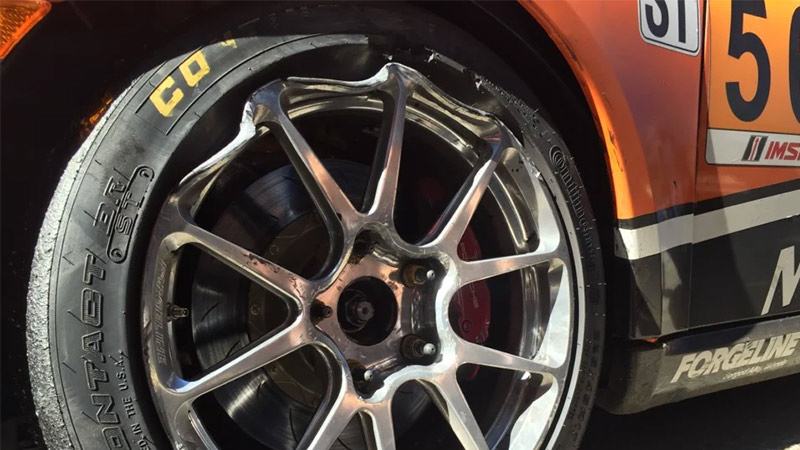
NO.7 Service life
Aluminum wheels, with their lightweight design, provide superior acceleration performance, reducing engine load for extended lifespan and reduced wear.
Moreover, the precise surface treatment of aluminum alloy wheels ensures tire airtightness, prolonging tire life and decreasing maintenance costs. Their excellent corrosion resistance prevents rusting, enhancing overall wheel durability.
In contrast, steel wheels have some differences. Despite being relatively heavier and potentially offering lower acceleration performance compared to aluminum alloy wheels, they are more robust, easier to repair, and have lower maintenance costs.
However, steel wheels are susceptible to deformation from impact forces, which may affect their longevity.
NO.8 Application
Aluminum wheels are predominantly used in automobiles, sports cars, and race cars, benefiting from their lightweight construction, superior acceleration performance, and fuel efficiency advantages.
Conversely, steel wheels find their primary application in large trucks and construction vehicles, as they provide the durability and stability needed for heavy-duty work requirements.
Both types play significant roles in various vehicle types, and as technology advances, their usage may extend further.
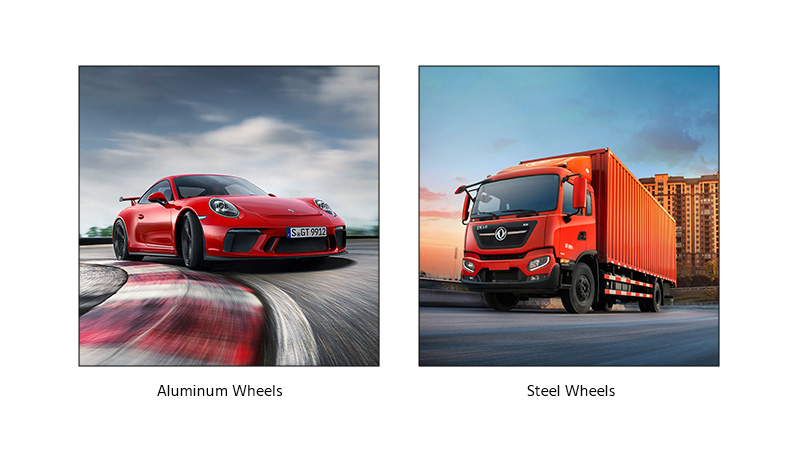
NO.9 Future development
In the future, aluminum wheels, steel wheels, magnesium alloy wheels, and carbon fiber wheels will continue to thrive and play essential roles in the automotive industry.
Steel wheels will retain their significance in heavy-duty applications, serving large trucks, specialized vehicles, and construction equipment due to their stability and cost-effectiveness.
Aluminum wheels will remain popular in the automotive, sports car, and racing sectors, thanks to their lightweight design and excellent acceleration capabilities.
Advancements in material technology will further enhance the strength and durability of aluminum alloy wheels.
Magnesium alloy wheels, known for their exceptional strength-to-weight ratio and fatigue resistance, are expected to find broader applications in the automotive industry, contributing to improved fuel economy and environmental performance.
Carbon fiber wheels, a promising emerging material, offer outstanding lightweight properties and high strength, leading to rapid growth in the high-end supercar and racing segments. However, their current predominant usage is in high-performance luxury vehicles.


